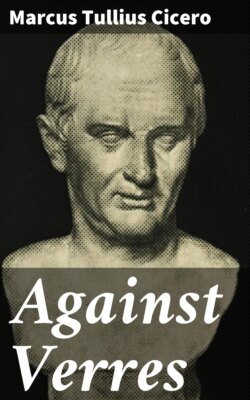Читать книгу Against Verres - Marcus Tullius Cicero - Страница 67
На сайте Литреса книга снята с продажи.
45
ОглавлениеTable of Contents
115Listen to another new edict of the fellow in a case of frequent occurrence; and then, while there is any place where civil law can be learnt, pray send all the youths of Rome to his lectures. The genius of the man is marvellous; his prudence is marvellous. A man of the name of Minucius died while he was praetor. He left no will. By law his inheritance passed to the Minucian family. If Verres had issued the edict which all praetors both before and after him did issue, possession would have been given to the Minucian family. If any thought himself heir by will, though no will was known, he might proceed by law to put forward his claim to the inheritance; or if he had taken security for the claim, and given security, he then proceeded to try an action for his inheritance. This is the law which, as I imagine, both our ancestors and we ourselves have always been accustomed to. See, now, how that fellow amended it. 116He composes an edict;—such language that any one can perceive that it was written for the sake of one individual. He all but names the man; he details his whole cause; he disregards right, custom, equity, the edicts of all his predecessors. "According to the edict of the city praetor,—if any doubt arises about an inheritance, if the possessor does not give security..." What is it to the praetor which is the possessor? Is not this the point which ought to be inquired into, who ought to be the possessor? Therefore, because he is in possession, you do not remove him from the possession. If he were not in possession, you would not give him possession. For you nowhere say so; nor do you embrace anything else in your edict except that cause for which you had received money. What follows is ridiculous. 117"If any doubt arises about an inheritance, and if testamentary papers are produced before me, sealed with not fewer seals than are required by law, I shall adjudge the inheritance as far as possible according to the testamentary papers." So far is usual. This ought to follow next: "If testamentary papers are not produced..." What says he? That he will adjudge it to him who says he is the heir. What, then, is the difference whether testamentary papers are produced or not? If he produces them, though they may have only one seal less than is required by law, you will not give him possession; but if he produces no such papers at all, you will. What shall I say now? That no one else ever issued a similar edict afterwards? A very marvellous thing, truly, that there should have been no one who chose to be considered like that fellow! He himself, in his Sicilian edict, has not this passage. No; for he had received his payment for it. And so in the edict which I have mentioned before, which he issued in Sicily, about giving possession of inheritances, he laid down the same rules which all the praetors at Rome had laid down besides himself. From the Sicilian edict,—"If any doubt arise about an inheritance..."
